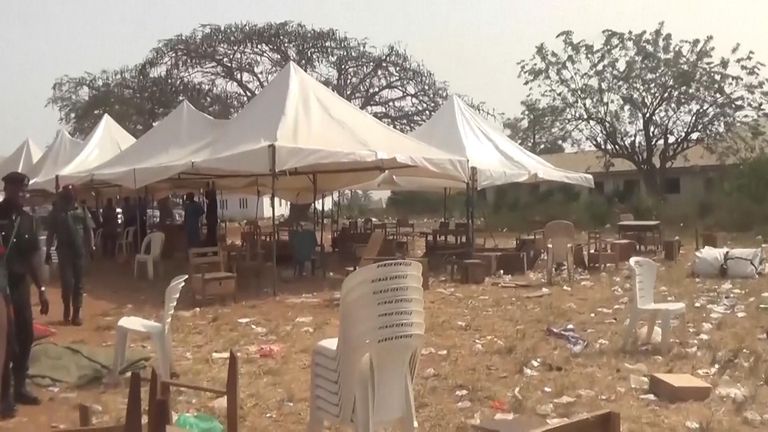The recent spate of stampedes in Abuja, Anambra, and Ibadan is not merely a series of isolated incidents but a stark reminder of the systemic failures that continue to plague Nigeria, particularly in relation to poverty, hunger, and the lack of effective crowd management.
In the space of just four days, these tragedies claimed the lives of dozens, with many others left injured. The fact that these deaths occurred during the distribution of palliatives—intended to ease the hardships of Nigerians—makes the situation even more tragic and ironic. The very system designed to provide relief has instead become a stage for unimaginable loss.
In Abuja, a stampede at the Holy Trinity Catholic Church in Maitama resulted in the deaths of at least 10 people, including children, as thousands scrambled for food aid. The horrific scenes highlighted the consequences of poverty and a failure to anticipate the strain that such distributions can cause when poorly organized.
The tragedy did not stop there. Just days earlier, a similar calamity occurred in Okija, Anambra State, during the annual rice distribution organised by local benefactor Obijason. Eyewitnesses reported that the stampede, involving thousands of people, led to the deaths of at least 19 individuals, including pregnant women. The crowd, having gathered from early morning in anticipation of the rice distribution at dawn, became uncontrollable once it began, resulting in panic and disaster. In the aftermath, bodies were found scattered around the area, and the injured were rushed to nearby hospitals. The incident was so severe that local authorities had to secure the area, while videos of the tragedy quickly went viral on social media.
Both of these incidents point to a much larger issue facing the country—worsening hunger and widespread poverty. The Civil Society Legislative Advocacy Centre (CISLAC) has rightly pointed out that these deaths are a direct consequence of the growing desperation among the populace due to economic hardship. Hunger has driven people to the brink, making them willing to risk their lives for the promise of a basic meal or a packet of rice.
This is a deep and pervasive crisis that transcends the immediate issues of crowd control at these events. In a country where millions are struggling to feed themselves and their families, such tragedies are not just inevitable; they are a reflection of the failure of leadership and governance.
While the intentions of the organisers were noble, the sheer scale of the crowds and the lack of adequate security measures led to devastating consequences. The absence of a clear, enforceable system for managing such events has resulted in a loss of life that could have been avoided with proper planning and foresight.
As President Bola Tinubu has stated, such tragedies should be preventable if organisers adhere to safety protocols and ensure crowd control. His words resonate deeply, given that these are not the first such tragedies to occur in recent years.
But the question remains: why do such tragedies continue to happen? Why does it take multiple deaths to bring attention to the lack of planning and preparation for palliative distributions, despite similar incidents in the past?
The answer lies in the systemic failures that plague Nigeria. There is a lack of coordination between government agencies, NGOs, and local authorities. Event organisers, whether they are religious institutions, community groups, or private benefactors, are often left to navigate the complexities of crowd control on their own. This disorganisation, combined with the overwhelming economic pressures faced by the populace, creates a perfect storm for tragedy.
The growing desperation for food is not a new phenomenon. Nigerians have long faced severe economic challenges, but the current wave of hunger, exacerbated by inflation, unemployment, and rising food prices, has reached a new level. The idea that millions of people feel compelled to rush to food distributions and even risk their lives to obtain basic necessities speaks volumes about the state of the nation’s social and economic systems.
It reflects a society where survival has become a daily struggle for many, and where hunger, rather than hope, defines the lives of too many Nigerians.
The government must not only address the immediate issue of poor event management but also tackle the root causes of hunger and poverty. Nigeria cannot afford to wait for another tragedy before taking meaningful action.
The way forward requires a multi-pronged approach. First, there must be an urgent reevaluation of how palliative distributions are organised. The government must invest in long-term economic recovery plans, focusing on job creation, sustainable agriculture, and poverty alleviation programmes. The country’s social safety nets need to be strengthened to ensure that no one is left behind in these difficult times.
Lastly, there must be a shift in how the government and society at large view the poor and vulnerable. The idea that individuals should have to risk their lives to receive basic assistance must be rejected. It is the responsibility of the state to ensure that its citizens, especially the most vulnerable, have access to food, healthcare, and education without putting their lives in danger.
While the victims of these tragedies cannot be brought back, their deaths should serve as a lesson and a pressing call for systemic change. If Nigeria is to move forward, it must address the root causes of hunger and poverty, ensure better planning for humanitarian efforts, and take responsibility for the lives of its citizens. Only then can we hope to prevent further loss of life in such tragic circumstances.

